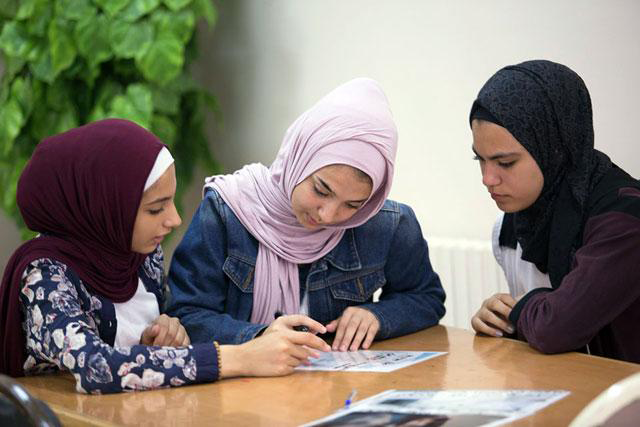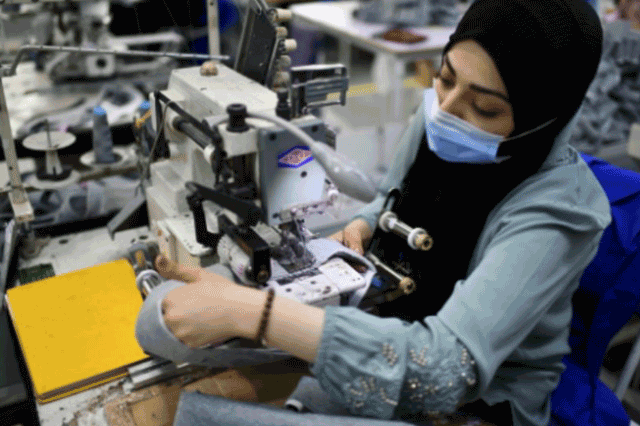You are here
‘Jordanian universities open to receiving Syrian students, need funds’
By Laila Azzeh - Jun 25,2015 - Last updated at Jun 25,2015
AMMAN — Accessing higher education in Jordan is no longer a far-fetched possibility for Syrian refugees.
The EU and UNESCO are working to build the capacity of local authorities and educational institutions to collect data needed to identify the number of refugees eligible for higher education.
“Our universities are ready to receive Syrian students provided that we have the necessary support and funding,” Higher Education Ministry Secretary General Hani Dmour said on Thursday.
Speaking on behalf of Higher Education Minister Labib Khadra, he noted that this step requires extending “huge” support to Jordan, which “understands the significance of higher education for Syrian refugees”.
Dmour made the remarks at a ceremony to announce the results of the newly launched UNESCO-EU Jami3ti (my university) Initiative, which seeks to come up with a nationwide database on young Syrians residing in the Kingdom to better understand their interests and needs.
The first stage of the assessment was conducted in partnership with telecom operators in Jordan using an SMS campaign, according to UNESCO.
A targeted audience of Syrian refugees (16-30 years old) across the country was sent a text message with five short questions.
The response to the SMS survey was free of charge and a call centre followed up on the texts to facilitate the completion of educational profiles and needs on the Jami3ti website for respondents in host communities as well as camps.
A computer lab in Zaatari Refugee Camp along with partner organisations’ sites were also utilised to facilitate the registration of educational profiles and needs on the Jami3ti website.
“This assessment is an ongoing initiative, with further data to be collected by the call centre, which will also follow up on all registered youths who are not yet able to complete their profiles,” according to UNESCO.
The preliminary results of mapping the higher education needs and opportunities for Syrians showed that 2,001 participants registered in the initiative, of which 949 had fully completed their profiles and were selected for preliminary analysis.
The majority of respondents had finished high school, with a “slightly” higher proportion of females, according to the survey.
“The results indicate that although many Syrians living in Jordan had completed high school, comparatively, few had continued to higher education.”
Moreover, slightly more males than females were in undergraduate or bachelor’s programmes, with 25 per cent of males with higher education, compared to 20 per cent of females.
A “slightly” higher proportion of males (80 per cent) said they had been out of school for two years or more, compared with 78 per cent of females.
The vast majority of respondents (90 per cent) said they received their highest level of education in Syria, while 8 per cent said they received it in Jordan.
The educational history of males and females residing in the Zaatari camp was found to “follow similar trends to a certain degree as in the host community”.
“These findings indicate that initiatives designed to utilise the education background of refugees to further develop their skills... could take a similar approach across the nation,” the survey said.
With regard to interests, 92 per cent cited preference for a degree rather than non-degree/certificate earning programmes, while 94 per cent preferred campus programmes, and “very few” expressed interest in online/blended studies.
Thirty per cent of female respondents and 15 per cent of males expressed their interest in staying in Jordan to continue their education.
The findings indicate that Syrian refugees residing in Jordan are substantially more interested in formal university degree programmes than in short courses.
Females are more interested in furthering their general education, while males have “slightly” higher preferences to specialise in specific vocations, according to the survey, which also covered the refugees’ preparedness to enrol in university and the preparatory courses they need.
In addition, it showed that the lack of financial resources to start or resume university is the most “severe” barrier to continue learning.
UNESCO Representative to Jordan Costanza Farina underlined the importance of the data in mobilising advocacy and inspiring demand-driven solutions for young people in need of higher education.
“We call on donor countries and organisations as well as service providers to benefit from the portal and cooperate with the Kingdom in this endeavour,” Dmour said.
Joanna Wronecka, EU ambassador to Jordan, noted that the initiative is also open to Jordanians and seeks to reach 3,000 young people.
The Jami3ti website (https://amman.unesco.org/home/index/) provides an online platform to disseminate relevant information to those that are either seeking or providing higher education opportunities or services.
Related Articles
AMMAN — The illiteracy rate among Jordanian women (15 years and older) decreased to 7.3 per cent in 2022, compared to 9.5 per cent in 2015,
AMMAN — A survey recently published by the United Nations High Commissioner for Refugees (UNHCR) revealed that only 13 per cent of Syrian re
The unemployment rate during the first quarter of 2014 went down slightly compared to the same period of last year, according to the latest survey conducted by the Department of Statistics (DoS).















